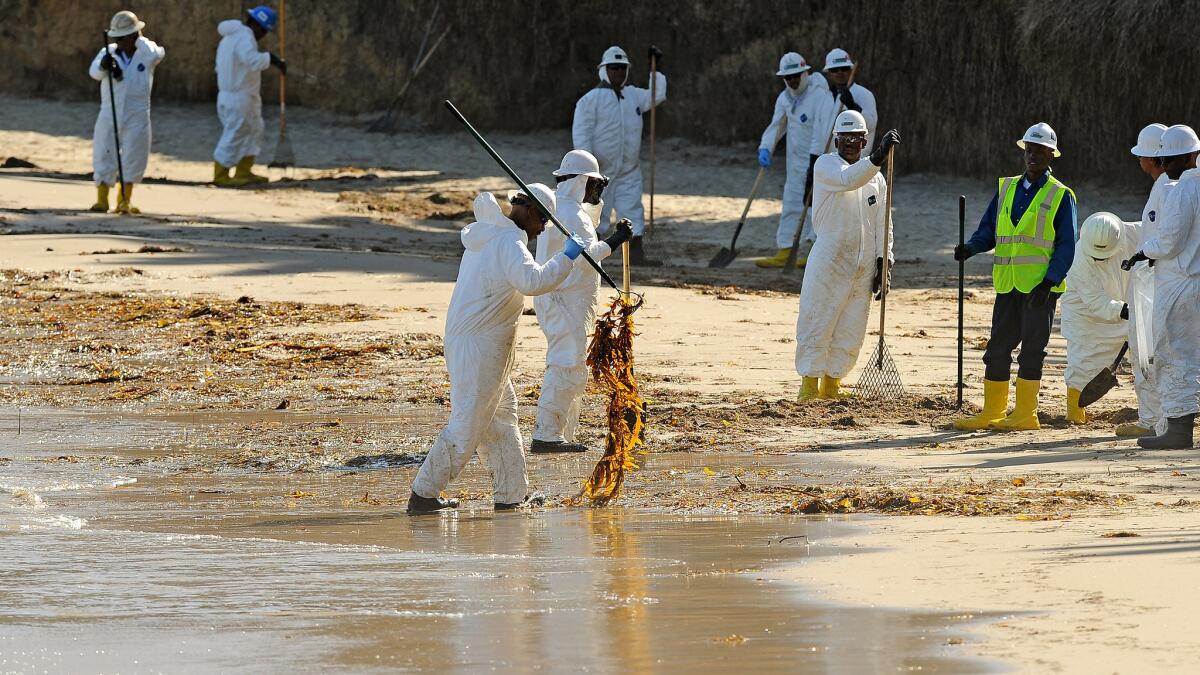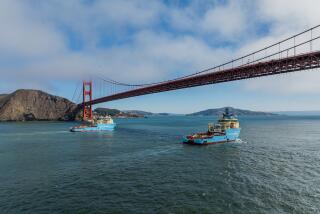Officials: Cost to clean oiled Santa Barbara beaches exceeds $60 million

Oil spill cleanup at Refugio State Beach.
Reporting from SANTA BARBARA â Cleaning up the thousands of gallons of crude oil that spilled into the Pacific Ocean near Refugio State Beach on May 19 has cost more than $60 million, officials said Wednesday, and the figure is expected to climb as the cleanup continues.
Cleanup costs hit a peak of about $3 million a day after a ruptured pipe spilled as much as 101,000 gallons of oil along the Gaviota coast in Santa Barbara County last month, said Meredith Mathews, a spokeswoman for Plains All American Pipeline, which owns the broken pipeline.
The company is paying to deploy more than 1,000 workers, skimming boats, ecological monitors and other resources along a 96.5-mile stretch of coast from Gaviota to Point Mugu near Oxnard. State and federal agencies responding to the spill will also bill the company for their costs.
The $60 million only accounts for cleanup costs. It does not include financial damage claims from people and businesses that might have been affected by the spill, Mathews said.
Santa Barbara fisherman Stace Cheverez filed a lawsuit against Plains last week. He is seeking damages because the spill led to a ban on fishing in a 138-mile zone off the coast. A dozen other fishermen and local businesses have met with lawyers and may join the case, said Daniel Mensher, one of Cheverezâs attorneys.
The spill could also result in fines against the company under the Clean Water Act.
Workers have cleaned up 76% of the damaged stretch of beach, mostly sandy areas that had only trace amounts of oil, officials said.
âInitially, you see a lot of progress upfront, in the first week or two, where you get the really gross oil off the water and the gross oil off the beach,â said U.S. Coast Guard Capt. Jennifer Williams, a federal on-scene coordinator of the spill response. âWe accomplished that. Now we are at a stage where we are doing a lot more tedious work.â
On Wednesday, workers in white protective suits at Refugio State Beach carefully placed individual oiled rocks on large sheets of plastic, scraping the oil off with putty knives and wire brushes.
The cleanup effort is now focused on cleaning soil, boulders and bedrock that were stained when as many as 21,000 gallons of thick crude made its way from where the pipe ruptured down a storm culvert, onto cliffs and into the Pacific, said Eric Hjelstrom, state parks superintendent for the Santa Barbara area.
Along the path the oil took to the ocean, a team of workers using a crane dug down several feet to bedrock and removed thousands of cubic yards of contaminated soil. Oil will be removed from the contaminated soil and the clean dirt will be recycled to make roads, Plains officials said. New soil will be brought in as scientists make a plan to restore the area, state and federal officials said.
As of Wednesday, 158 dead birds and 85 dead marine mammals had been recovered from the spill area, including 64 dead California sea lions, according to the Oiled Wildlife Care Network at UC Davis.
Follow @jpanzar on Twitter
More to Read
Sign up for Essential California
The most important California stories and recommendations in your inbox every morning.
You may occasionally receive promotional content from the Los Angeles Times.










